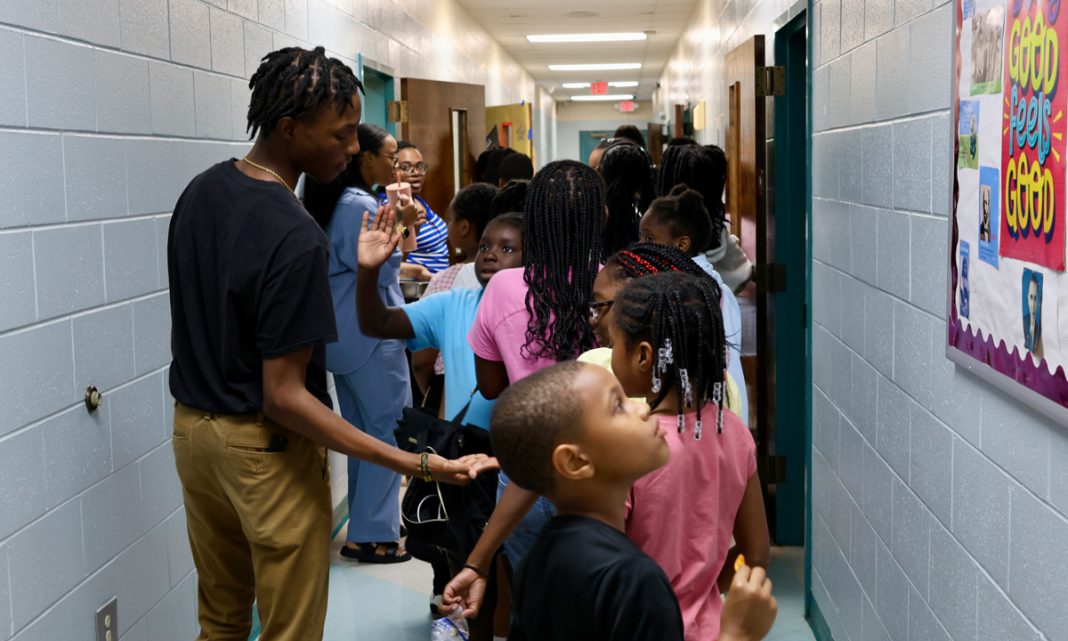Politicians love to say, “We must protect our children. They are our future.” But looking at what’s happening in Congress right now, children are not being protected. Families are not being prioritized. Instead, lawmakers are locked in a standoff, waiting to see who blinks first as they fight over who gets the last word and how big of a tax break they can give the wealthiest Americans.
Meanwhile, families — especially families of color and low-income families — are left to hold their breath and wonder what this shutdown means for them. As members of Congress keep making their rounds on television, babies still need formula, toddlers still need health screenings, children still need breakfast and lunch at school and in their child care programs, and parents still need child care so they can work. Amid extreme stress, families are left, wondering how they will be able to take care of their children.
Get stories like this delivered straight to your inbox. Sign up for The 74 Newsletter
The demands of children and their families do not stop just because Congress is at a standstill.
According to Kids’ Share 2024, an annual report published by the Urban Institute about federal expenditures, children received only about 9% of all federal spending in 2023, while about 43% of federal spending went toward health and retirement benefits for adults 18 years and older. That’s a very small percentage for a nation in which politicians on both sides of the aisle have expressed interest in increased government investment in children. These numbers contradict the narrative that claims children matter because they are our future.
That 9% starts to feel even smaller during a government shutdown. Some programs, like Social Security, Medicaid and Medicare, are mandatory, meaning they don’t require annual congressional approval. But others, including a number of crucial children’s programs, such as the Special Supplemental Nutrition Assistance Program for Women, Infants, and Children (WIC), are funded through the annual appropriations process, which Congress must approve. This means when lawmakers can’t agree on a budget, these critical programs are left in limbo.
The fallout on the horizon from this needless dysfunction is becoming clearer.
In September, the National WIC Association reminded the public that WIC only had enough funds to temporarily remain open during a government shutdown. Now, according to Reuters, at least two dozen state websites warn there could be an unprecedented benefit gap for more than 41 million people in America who get aid from the Supplemental Nutrition Assistance Program (SNAP) and the nearly 7 million people who rely on WIC.
Georgia Machell, president and chief executive officer of the National WIC Association, delivered this sobering news last week.
“Without additional support, State WIC Agencies face another looming crisis,” she said. “Several are set to run out of funds to pay for WIC benefits on November 1 and may need to start making contingency plans.”
Parents Worry as WIC Funding Dwindles During the Government Shutdown
Many families in historically marginalized communities, who already face greater barriers to health care, housing and early education, will feel this impact even more sharply. For example, we know that tens of thousands of young children and families rely on vital support received through Head Start, a service that promotes early learning and development, health and well-being. The shutdown is already in its fourth week, and, according to a statement issued on Oct. 16 from the National Head Start Association, if the government shutdown doesn’t end by Nov. 1, more than 65,000 children and families will be at risk of losing critical services.
A missed doctor’s appointment, a delay in SNAP benefits or a gap in child care isn’t just inconvenient. It can destabilize a family and hinder a child’s development, especially in the classroom.
As Time Runs Out, a Dozen Head Start Families and Providers Share Their Fears
A research brief published by The Food Research & Action Center highlighted the links between hunger and learning, stating that “behavioral, emotional, mental health, and academic problems are more prevalent among children and adolescents struggling with hunger” and that young people experiencing hunger have lower math scores and poorer grades. The shutdown will have real and lasting consequences on the learning, development and well-being of America’s children because these programs are being impacted.
It’s frustrating to watch lawmakers stand at podiums and declare how much they care about children while their actions — or inaction — puts children at risk.
Words don’t put food on the table. Words don’t pay rent. But actions do.
And right now, the actions coming out of Congress are sending an unfortunate message to families: protecting children is not the priority.
If children truly are our future, then they cannot be treated as bargaining chips. Children deserve more than 9% of America’s federal spending budget. We need federal budgets that reflect children’s needs and protection for essential services. Critical programs that protect child health and well-being should never be disrupted by a government shutdown.
Finally, Americans deserve government accountability. Policymakers should be held responsible for their words and actions, especially when they fail to deliver on the promises they make about protecting children.
Children cannot wait. They are growing, learning and developing right now. The choices we make as a country today will shape their tomorrow.

